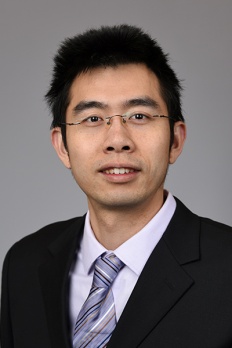Huang Xinxin
 Xinxin Huang, Ph.D.
Xinxin Huang, Ph.D.
2010 Ph.D. in Genetics and Developmental Biology, National Institute of Biological Science, Beijing, China
2006 B.S. in Biology, Department of Biological Science, Beijing Normal University, China
2019-present Principal Investigator at Institutes of Biomedical Sciences, Fudan University
2019-present Principal Investigator at Zhongshan-Xuhui Hospital, Fudan University
2018-2019 Assistant Research Professor in Department of Microbiology and Immunology, Indiana University School of Medicine, Indianapolis, IN
2012-2018 Postdoctoral Researcher in Dr. Hal Broxmeyer lab, Department of Microbiology and Immunology, Indiana University School of Medicine, Indianapolis, IN
2010-2012 Postdoctoral Researcher in Dr. Hong Zhang lab, National Institute of Biological Science, Beijing, China
Institutes of Biomedical Sciences, Fudan University, Shanghai 200032 Tel: +86 21 54237702
Email: xinxinhuang@fudan.edu.cn
Xinxin Huang received his BS at Beijing Normal University, China and his PhD at National Institute of Biological Science (NIBS), Beijing, China. During his graduate study, he had the opportunity to work on different projects and gained strong experience in various fields, such as stem cell symmetric/asymmetric division, developmental timing control, sex determination and dosage compensation, aging in adulthood, and autophagy.He continued to stay in the NIBS after graduation and carried on a genome-wide RNAi screen to find novel autophagy regulators and tried to reveal the underlying mechanisms of autophagy regulation during animal development. During his postdoctoral training in Dr. Hal E. Broxmeyer's laboratory at Indiana University School of Medicine, he focused on the regulation of human hematopoietic stem cells, aimed at enhancing the efficacy during harvest and ex vivo expansion of human hematopoietic stem cells. In 2019, he started his lab at Institutes of Biomedical Sciences, Fudan University to continue his studies on hematopoietic stem cell biology. His current research interest lies in regulation of stem cell mobilization, expansion and maintenance of hematopoietic stem cells, and cell reprogramming.
Dr. Huang has been on the Editorial Board of Stem Cell Reviews and Reports, and is currently the Associate Editor for Frontiers in Hematology journal. During his career, he has received many awards, including Outstanding Grad of Beijing, 2006; National Institute of Biological Science Research Presentation Award, 2009; First-prize Presentation Award in 2nd Chinese C. elegans Meeting, 2011; 58th ASH Annual Meeting Abstract Achievement Award, 2016; Indiana University Cancer Research Day Presentation Award, 2017; Cooperative Center of Excellence in Hematology (CCEH) Research Award, 2017; 60th ASH Annual Meeting Abstract Achievement Award, 2018; Cooperative Center of Excellence in Hematology (CCEH) P&F Grant Award, 2019; Shanghai Innovative Talent Project, 2020; National Natural Science Foundation--Outstanding Youth Project, 2022.
Hematopoietic cell transplantation (HCT) remains the only curative treatment for many malignant and non-malignant blood disorders. However, 30%-40% of patients will be excluded from this treatment because of not having an HLA-matched donor. Human cord blood is a feasible source of hematopoietic stem cells (HSCs) for transplantation. Human cord blood has a reduced need for HLA matching, which extends the treatment to nearly all patients. My laboratory focuses on how to improve HCT efficiency of human cord blood through manipulation of epigenetic and metabolic pathways. We are using molecular biology, cell biology, bioinformatics, mouse genetics and other methods to study the regulation of HCT and HSCs, aiming at speeding up the translational process from basic research to clinical applications. Our research will benefit patients with a variety of blood diseases. To date, we have published more than 40 papers in the international recognized professional journals, including Cell, Nature Medicine, Nature Communications and Leukemia.
Xu D, Yang M, Capitano M, Guo B, Liu S, Wan J, Broxmeyer HE#, Huang X#. (#corresponding) Pharmacological activation of nitric oxide signaling promotes human hematopoietic stem cell homing and engraftment. Leukemia. 2021 Jan;35(1):229-234.
Huang X#, Guo B#. (#corresponding) Update on preclinical and clinical efforts on ex-vivo expansion of hematopoietic stem and progenitor cells. Curr Opin Hematol. 2022 Jul 1;29(4):167-173.
Huang X#, Broxmeyer HE. (#corresponding) Progress towards improving homing and engraftment of hematopoietic stem cells for clinical transplantation. Curr Opin Hematol. 2019 Jul 26(4):266-272.
Huang X, Guo B, Capitano M, Broxmeyer HE. Past, present, and future efforts to enhance the efficacy of cord blood hematopoietic cell transplantation. F1000Res. 2019 Oct 31;8:F1000 Faculty Rev-1833.
Huang X*, Guo B*, Liu S, Wan J, Broxmeyer HE. (* co-equal contribution) Neutralizing negative epigenetic regulation by HDAC5 enhances human hematopoietic stem cell homing and engraftment. Nature Communications. 2018 Jul 16;9(1):2741.
Guo B*, Huang X*, Lee MR, Lee SA, Broxmeyer HE. (* co-equal contribution) Antagonism of PPAR-γ signaling expands human hematopoietic stem and progenitor cells by enhancing glycolysis. Nature Medicine. 2018 Mar;24(3):360-367.
Huang X and Broxmeyer HE. m6A reader suppression bolsters HSC expansion. Cell Research. 2018 Sep;28(9):875-876
Huang X. Trinh T, Aljoufi A, Broxmeyer HE. Hypoxia signaling pathway in stem cell regulation: good and evil. Curr Stem Cell Reports. 2018 Jun. 4(2):149-157.
Huang X, Lee MR, Cooper S, Hangoc G, Hong KS, Chung HM and Broxmeyer H E. Activation of OCT4 enhances ex vivo expansion of human cord blood hematopoietic stem and progenitor cells by regulating HOXB4 expression. Leukemia, 2016 Jan;30(1):144-153.
Capitano M, Mohamad S, Cooper S, Guo B, Huang X, Gunawan A, Sampson C, Ropa J, Srour E, Orschell C, Broxmeyer HE. Mitigating oxygen stress enhances aged mouse hematopoietic stem cell numbers and function. J Clin Invest. 2021 Jan 4;131(1):e140117
Shin D, Huang X, Gil CH, Aljoufi A, Ropa J, Broxmeyer HE. Physioxia enhances T cell development ex vivo from human hematopoietic stem and progenitor cells. Stem Cells. 2020 Nov;38(11):1454-1466.
Capitano M, Zhao L, Cooper S, Thorsheim C, Suzuki A, Huang X, Dent AL, Marks MS, Abrams CS, Broxmeyer HE. Phosphatidylinositol transfer proteins regulate megakaryocyte TGF-β1 secretion and hematopoiesis in mice. Blood. 2018 Sep 6;132(10):1027-1038.
Mantel CR, O'Leary HA, Chitteti BR, Huang X, Cooper S, Hangoc G, Brustovetsky N, Srour EF, Lee MR, Messina-Graham S, Haas DM, Falah N, Kapur R, Pelus LM, Bardeesy N, Fitamant J, Ivan M, Kim KS, Broxmeyer HE. Enhancing hematopoietic stem cell transplantation efficacy by mitigating oxygen shock. Cell. 2015 Jun 161(7):1553-1565